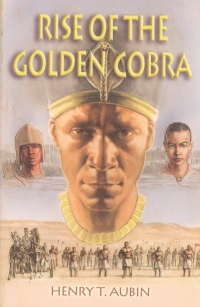| ________________
CM . . .
. Volume XIII Number 20 . . . .May 25, 2007 
 |
Rise of the Golden Cobra: A Novel for Young Adults.
Henry T. Aubin.
Toronto, ON: Annick Press, 2007.
255 pp., pbk. & cl., $12.95 (pbk.), $21.95 (cl.).
ISBN 978-1-55451-059-7 (pbk.), ISBN 978-1-55451-060-3 (cl.).
Subject Heading:
Piankhi, King of Kush, fl. 720 B.C.-Juvenile fiction.
Grades 6-10 / Ages 11-15.
Review by Betty Klassen.
**** /4
|
| |
|

excerpt:
Nebi put down the bow in exasperation. "Why do you want me to kill him?"
"It's silly to be moral in a war. You're too much like my father. War is about doing everything you can to win. Nimlot deserves to die."
"The king will punish Nimlot when he gets the chance - and you know as well as I do that he'll be harsh. Nimlot not only betrayed him but killed one of his oldest friends."
"Stop waiting for justice. It can take forever. And it can make mistakes. Be a man."
Nebi flinched at the remark. He started to say something, then stopped, hating himself for feeling so flustered.
The older youth [Sheb] took a step forward and grasped the iron arrowhead hanging around Nebi's neck. He clicked his thumbnail against its jagged edge. "You know what I'd do if I were you? I'd stick this arrowhead on the end of a shaft and send it back to him - right between his ribs!"
The above exchange between Nebi and Sheb depicts a conflict of principle that is threaded throughout this novel. The reader is invited into this dialogue as the clash of wills between Nebi and Sheb is woven into a compelling plot that tells the story of King Piankhi's unification of Kush and North and South Egypt into the 25th Dynasty in eighth century BCE.
Nebi, a 14-year-old Egyptian boy, learns of a traitorous plot involving the Assyrians and Count Nimlot in a plan to take over Egypt. Nebi's schooling as a scribe is interrupted when he is the only survivor of an attack by Count Nimlot, and he travels south to warn King Piankhi.
Nebi's initial trepidation of meeting the king wanes as he comes to know him as a principled and compassionate man, chosen by the god Amon to rule the African kingdom of Kush. Piankhi is guided by maat, the ethical principle of ancient Egyptian religion denoting a life committed to 'justice,' 'order,' and 'truth.' He deeply desires to live a life of peace and, therefore, only goes to war because he wishes to protect his people from the harsh rule of the Assyrians. He instructs his generals to fight only when their enemies are prepared for battle, to pay for their supplies and not loot or destroy the cities they need to free from Nimlot's hands.
These principles are a source of frustration to his hot-headed young nephew, Sheb, who wants to win the war and take revenge, or, as he says in the above excerpt, "it's silly to be moral in a war." King Piankhi assigns Nebi the task of guarding his nephew Sheb. The sparring between these two very different young men results in a fast-moving and intriguing plot of military genius on Piankhi's part and rebellious compliance by Sheb and sometimes Nebi. It is a journey into manhood as Nebi learns the truth of the king's wisdom that, to find real freedom, you can't keep hatred in your heart.
Henry Aubin may have written this, his first novel for younger teen readers with his son in mind, looking for African heroes, but it is a novel that would appeal to many readers. It is a well-researched historical account of King Piankhi's unification of ancient Egypt, but it reflects the moral dilemmas that our political and military leaders of today face in the many wars that continue to be fought, many times with less honor.
Piankhi may be one of the lesser known rulers of Egypt but worthy of wearing the golden cobra crown and worthy of study in our middle year classrooms.
Highly Recommended.
Betty Klassen teaches Language Arts and Social Studies to Middle Year students in the Faculty of Education, University of Manitoba.

To comment
on this title or this review, send mail to cm@umanitoba.ca.
Copyright © the Manitoba Library Association. Reproduction for personal
use is permitted only if this copyright notice is maintained. Any
other reproduction is prohibited without permission.
NEXT REVIEW |
TABLE OF CONTENTS FOR THIS ISSUE
- May 25, 2007.
AUTHORS |
TITLES |
MEDIA REVIEWS |
PROFILES |
BACK ISSUES |
SEARCH |
CMARCHIVE |
HOME |
